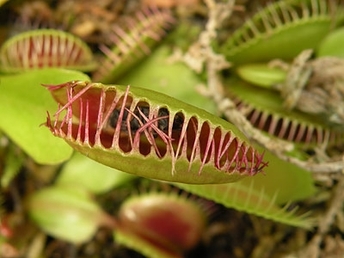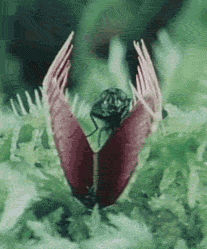
- spiders
- flies
- caterpillars
- crickets
- slugs
However, in addition to synthesizing glucose, plants also need to make amino acids, vitamins and other cellular components to survive. To accomplish this, plants needs additional nutrients like:
- nitrogen - to make amino acids, nucleic acids, proteins
- phosphorus - as part of the energy-carrying ATP molecule
- magnesium - as a co-factor that helps many enzymes function
- sulfur - to make some amino acids
- calcium - as an enzyme co-factor and to make plant cell walls
- potassium - to regulate water movement in and out of the plant
In the bogs favored by Venus Flytraps, the soil is acidic, and minerals and other nutrients are scarce. Most plants can't survive in this environment because they cannot make enough of the building blocks necessary for growth. The Venus Flytrap has evolved the ability to thrive in this unique ecological niche by finding an alternate means of getting key nutrients like nitrogen. Living creatures like insects provide a good source of the nutrients missing from the soil, and they also contain additional energy-laden carbohydrates.
source


 RSS Feed
RSS Feed
